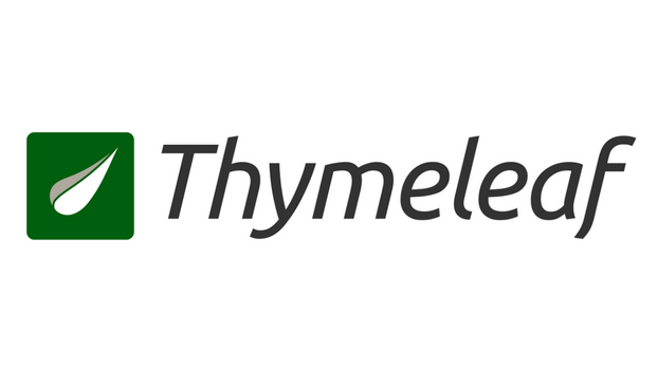
1. Thymeleaf 란
Thymeleaf는 View Template Engine입니다. 그리고 컨트롤러에서 전달받은 데이터를 이용해 동적인 페이지를 만들 수 있습니다.
태그의 속성으로 thymeleaf 명령어를 사용할 수 있으며 html 파일 내에서 사용이 가능합니다.
2. Thymeleaf 적용
spring boot 2.2.2.RELEASE 버전에서 테스트한 내용입니다.
thymeleaf의 default prefix는 src/main/resources/templates이며 suffix는 .html입니다.
1) dependency (pom.xml)
<dependencies>
...
<dependency>
<groupId>org.springframework.boot</groupId>
<artifactId>spring-boot-starter-thymeleaf</artifactId>
</dependency>
...
</dependencies> 2) Controller
import java.util.ArrayList;
import java.util.HashMap;
import java.util.List;
import java.util.Map;
import org.springframework.stereotype.Controller;
import org.springframework.web.bind.annotation.GetMapping;
import org.springframework.web.bind.annotation.RequestMapping;
import org.springframework.web.servlet.ModelAndView;
@Controller
@RequestMapping(value = "/")
public class HomeController {
@GetMapping("/")
public ModelAndView indexPage() {
//view name으로 page 파일 명을 입력한다.
//prefix + 파일명 + suffix
ModelAndView modelAndView = new ModelAndView("index");
Map<String, Object> info = new HashMap<>();
info.put("name", "kim");
info.put("age", 29);
List<String> datas = new ArrayList<>();
datas.add("red");
datas.add("orange");
datas.add("yellow");
modelAndView.addObject("info", info);
modelAndView.addObject("datas", datas);
return modelAndView;
}
}3) src/main/resources/templates/index.html
<!DOCTYPE html>
<html lang="ko" xmlns:th="http://www.thymeleaf.org">
<head>
<title>Thymeleaf Test</title>
<meta charset="UTF-8">
</head>
<body>
<th:block th:each="data:${datas}">
<h1 th:text="${data}"></h1>
</th:block>
<span th:text="${info.name}"></span>
<span th:text="${info.age}"></span>
</body>
</html>Controller에서 전달받은 datas와 info를 화면에 출력합니다.
4. thymeleaf 문법 정리
1) ${...} 표현식
${...} 표현식을 이용해 컨트롤러에서 전달받은 변수에 접근할 수 있으며 th:속성명 내에서만 사용할 수 있습니다.
2) @{...} 표현식
@{...} 표현식은 서버의 contextPath를 의미하며 @{/} 는 "/contextPath/" 를 의미합니다.
3) 문자 합치기
합치고 싶은 문자열을 "|" 으로 감싸거나 + 연산자를 이용해 문자를 합칠 수 있습니다.
<div th:text="|My name is ${info.name} !! |"></div>
<div th:text="'My name is '+ ${info.name} + ' !! '"></div>
4) 비교 연산자
<!-- 이항 연산자 -->
<div th:text="${info.name != 'kim'}"></div>
<div th:text="${info.age >= 30}"></div>
<!-- 삼항 연산자 -->
<div th:text="${info.name == 'kim' ? 'ok' : 'no'}"></div>
5) th:text
태그 내에 text를 수정합니다.
<div th:text="${info.name}"></div>
<!--<div>kim</div>-->
6) th:value
태그 내에 value를 수정합니다.
<input type='text' th:value="${info.name}">
7) th:if, th:unless
if else 속성을 이용해 조건문을 표현합니다.
<th:block th:if="${info.age < 30}">당신은 30대가 아닙니다.</th:block>
<th:block th:unless="${info.age >= 30}">당신은 30대입니다.</th:block>
8) th:switch, th:case
switch문을 이용해 조건문을 표현합니다.
<th:block th:switch="${info.name}">
<div th:case="lee"> 당신은 이씨 입니다.</div>
<div th:case="kim"> 당신은 김씨 입니다.</div>
</th:block>
9) th:each
each문을 이용해 반복문을 표현합니다.
<th:block th:each="data:${datas}">
<h1 th:text="${data}"></h1>
</th:block>
변수명 앞에 status 변수를 추가해 row에 대한 추가정보를 얻을 수 있습니다.
<th:block th:each="data,status:${datas}">
<h1 th:text="|${status.count} ${data}|"></h1>
</th:block> status 속성
index : 0부터 시작
count : 1부터 시작
size : 총 개수
current : 현재 index의 변수
event/odd : 짝수/홀수 여부
first/last : 처음/마지막 여부
'IT > Spring' 카테고리의 다른 글
| [SpringBoot] destroy event 등록하기 (0) | 2021.04.05 |
|---|---|
| [Spring Boot] 간단하게 @Scheduled 사용하기 (0) | 2021.03.31 |
| [Spring] thymeleaf-layout-dialect WARN 해결 (0) | 2021.02.15 |
| [Spring] 의존성 주입(Dependency Inject,DI)이란? (0) | 2020.11.16 |
| [Spring Boot] Hikari Connection Pool 설정 (0) | 2020.11.03 |